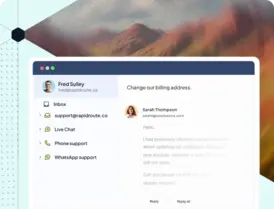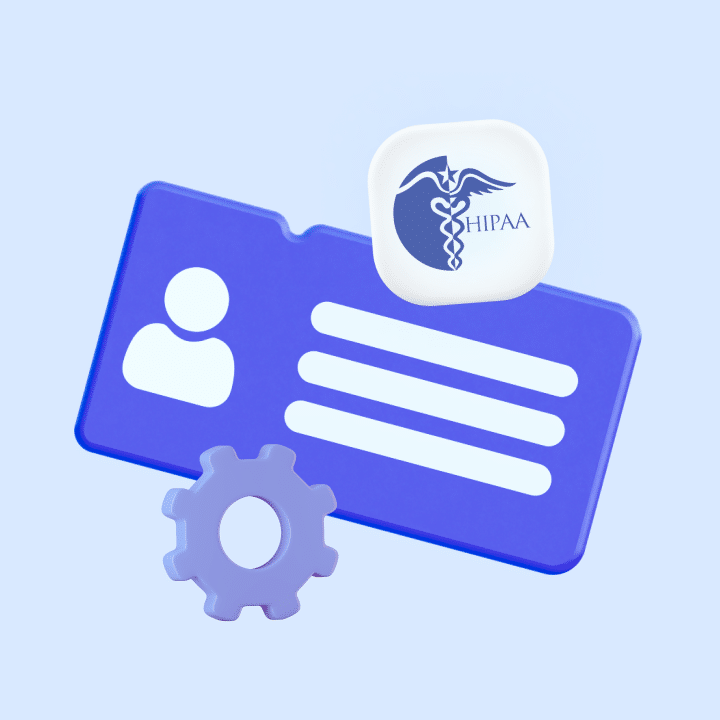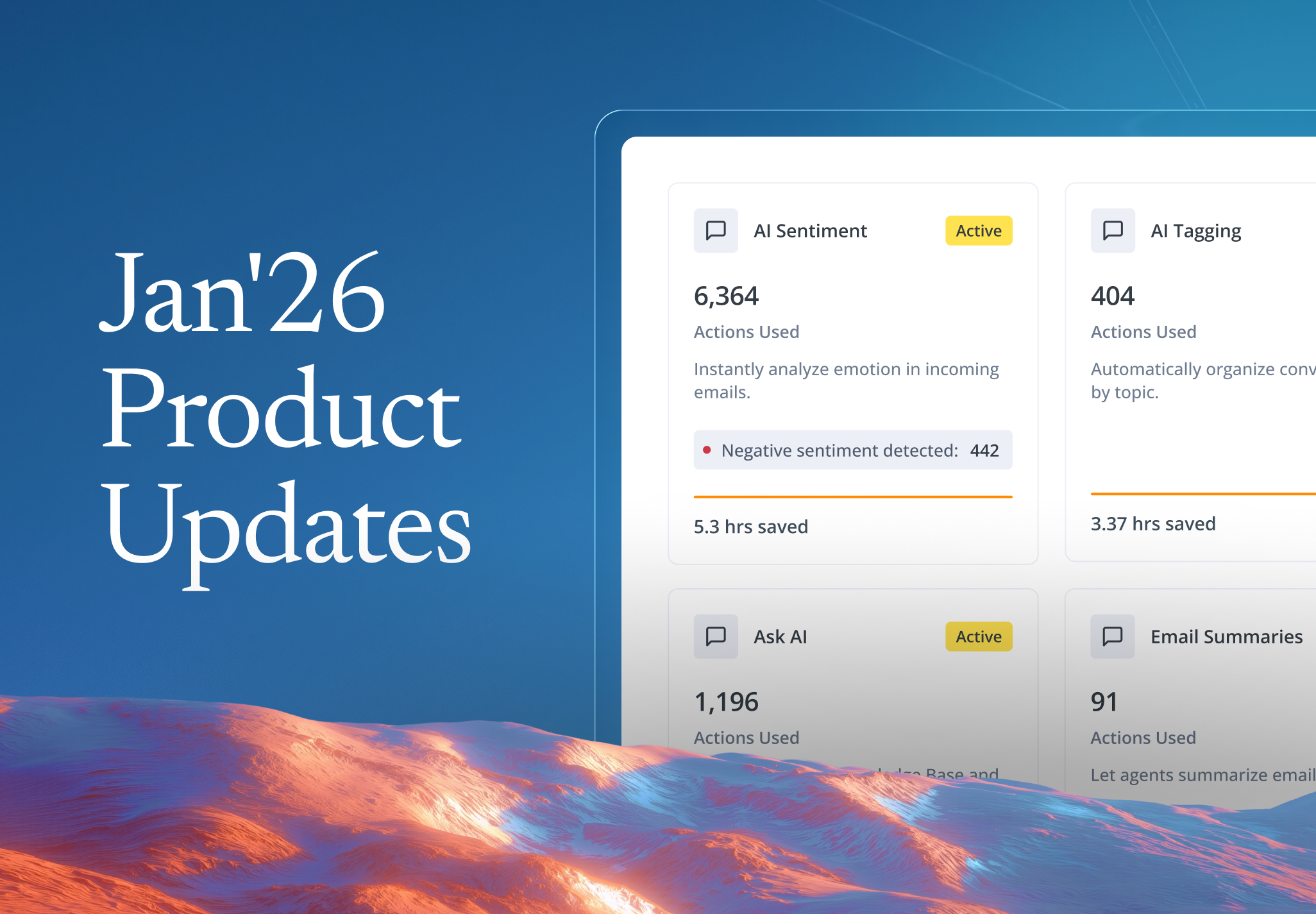Questions incoming for customer support leaders ?
Are you sending emails to multiple recipients by typing their email IDs individually?
Are you spending a long time adding multiple contacts to an email’s receiver list?
Do you manually send the follow-up email to each recipient in case of any changes to a sent email (think of typos or not attaching the required document)?
If your answer to any one of the above questions is yes, you need to know about distribution lists in Outlook.
An Outlook distribution list allows you to add multiple contacts to an email list and send emails to all of them at the same time. This means better contact management and an end to siloed communication in your team.
In this article, we will explain the steps to create an Outlook distribution email so you can better manage your team’s communication.
Table of Contents
- What is an Outlook distribution list?
- Why do you need an Outlook distribution list?
- How to create a distribution list in Outlook?
- Should you create an Outlook distribution list?
- Manage your emails better with Hiver
- Frequently Asked Questions
What is an Outlook distribution list?
An Outlook email distribution list allows you to send emails to multiple contacts simultaneously without manually entering their email IDs.
Managing team communication can be challenging in an enterprise set-up where you manage a large team residing in multiple locations, business units, and time zones. It often leads to some employees not receiving an update in time, causing inconvenience to the entire team.
By creating an Outlook distribution list, you can send updates to a large team without typing their email IDs each time you want to communicate something. This makes it possible to make last-minute changes, send meeting invites, or send a follow-up email to check in on an open issue.
Outlook distribution lists are useful for seamless team collaboration. They boost productivity and ensure that all team members, irrespective of their locations or business units, are on the same page. They replace siloed team structures to establish open communication.
Observe in the image below how there is a specific Outlook distribution list for all test engineers. This means that all updates targeted at test engineers will reach them at once.
Why do you need an Outlook distribution list?
As a customer support team leader, you will need to create an Outlook distribution list for the following reasons:
- Email your team members (Up to 50 or more) asking for updates on support tickets, update customers with the status of a ticket, or simply share an interesting read with your team
- Ensure that your team members working in the same organization but different departments (product team, sales team, marketing team) can also email all your team members to request new information or provide insights
- Manage all your contacts in one place in case of changes like a new member joining or removing an old member. The distribution list can be updated automatically
- Outlook distribution lists encourage sharing information privately with your team members and categorize teams based on their roles, teams, or projects
- Distribution lists are easy to manage as you can build a central database of all concerned team members. This means prompt information sharing and taking action faster
How to create a distribution list in Outlook?
Follow the below steps to create a distribution list in Outlook:
Step 1: Open the Microsoft Outlook app or web browser on your computer.
Step 2: Go to the Home tab and click on Address Book at the top right corner.
Step 3: Now click File followed by New Entry.
Step 4: Select New Distribution List and click OK. Now, name your distribution list.
Step 5: Click Select Members to add new members to the distribution list.
Step 6: Click OK, followed by Save & Close.
Should you create an Outlook distribution list?
But now the question is: is an Outlook distribution list worth it?
Below are the challenges associated with creating and maintaining an Outlook distribution list:
- You need about 60 minutes to create an Outlook distribution list. Therefore, you should wait for the appropriate duration before sending an email
- External members not part of a distribution list or outside your organization won’t receive the emails. The sender doesn’t receive a non-delivery message either, so they can resend the email separately
- Outlook doesn’t provide insights into email groups, open rates, clicks, and other analytics. Therefore, you cannot review the email performance across all lists
- For those who are already part of a distribution list, you cannot exclude them for a specific email. You have to remove them from your communications individually
- Microsoft 365 allows you to add up to 100,000 members to a distribution group. However, when sending an email to a long list of members, it often goes to spam on the recipient’s end
- Outlook doesn’t have a strong support team. If you face any difficulties managing your distribution lists, you can either wait for community response or hold back for an uncertain period to hear back from the support team
Manage your emails better with Hiver
While Outlook distribution lists are a great way to stay productive, they might not be the best solution for customer support teams. Support teams require a shared inbox to collaborate with remote teams. Team members can easily access a shared inbox and respond to emails from a single account.
Hiver’s shared inbox integrates with both Gmail and Outlook inboxes and helps you with the following:
- Delegate emails as tasks and assign tasks to the right support agent based on their skills
- Hiver’s @mention feature allows you to collaborate with your team members without forwarding or CCing emails
- Hiver’s custom SLA (Service Level Agreement) policy reminders ensure that your team prioritizes tasks nearing due dates
Frequently Asked Questions
1. What is the difference between an Outlook group and a distribution list
A distribution list is just for sending emails to multiple people. An Outlook group provides additional shared resources like a mailbox, calendar, document library, OneNote notebook, and more.
2. How to create a contact list in Outlook?
Go to the People page in Outlook. Select “New contact list,” name it, add members, and save. Contact lists are useful for sending emails to groups of people.
3. How to create an Outlook distribution list?
Open Outlook, go to the Home tab and select Address Book. Then click File > New Entry > New Distribution List. Name it, add members, and save.
 Skip to content
Skip to content











